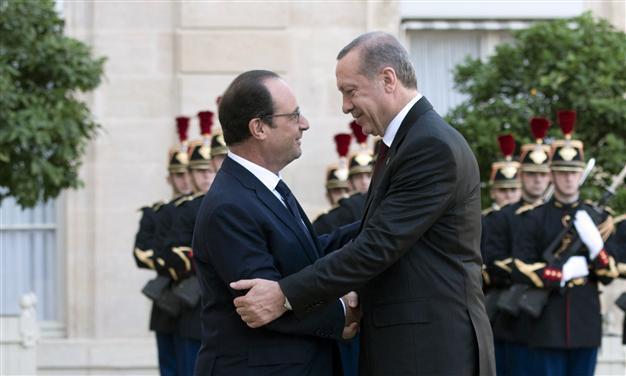Hollande becoming Erdoğan’s ‘new Berlusconi’ in defense
Burak Bekdil

France’s Hollande and Erdoğan met on Oct 31 to discuss the Syrian crisis but Turkish sources said they also discussed potential defense cooperation. AFP photo
For much of the 2000s, when prime ministers Recep Tayyip Erdoğan and Silvio Berlusconi did not hide their “personal friendship” and Italy was the staunchest supporter of Turkey’s EU bid, the arms trade between the two NATO allies boomed, with Italian companies winning multibillion dollar contracts in Turkey. Replace the name Berlusconi with François Hollande and "EU accession" with "a common policy on Syria," and the new winner may be French defense manufacturers.In 2010, the Italian Defense Ministry’s undersecretary, Guido Crosetti, called for a “strategic relationship” between the defense industries of Turkey and Italy. Italy’s defense giant, Finmeccanica, then opened a regional office in Turkey, by which point Italy had become Turkey’s largest defense supplier after the United States. Finmeccenica S.p.A. is the second largest industrial group and the largest of the high-tech industrial groups based in Italy. It works in the fields of defense, aerospace, security, transport and energy, and is partly owned by the Italian government, with the Treasury holding about 30 percent of its shares.
The contracts that Finmeccanica companies won included a multibillion deal for the coproduction of attack helicopters, maritime patrol aircraft, Sirio-class search and rescue boats, and Telespazio’s work to build Turkey’s first military satellite.
In the early 2000s French manufacturers, once big players on the Turkish market, were “red-listed” by Ankara in retaliation for a French parliamentary resolution that recognized the Armenian genocide of 1915-19. The French industry sought deals unsuccessfully after the Turkish boycott disappeared one decade later, but now they could make signs of a powerful comeback due to Ankara and Paris' rediscovering of their political alliance.
Analysts say convergent interests over Syria and a common quest to seek the downfall of Syrian President Bashar al-Assad have brought Ankara and Paris together.
“Our position on Syria comes closest to the French among our Western allies,” a senior Turkish diplomat said. “This is quite appreciated by our leaders.”
Hollande’s state visit to Turkey last January, the first visit by a French president to Ankara in 22 years, saw top-level political and defense talks, with an emphasis on a controversial Turkish contract in which a French-European bidder had come second.
Hollande and Erdoğan met in Paris Oct. 31 to discuss the Syrian crisis, but Turkish sources said they also discussed potential defense cooperation in general, and the multibillion dollar Turkish contract for the country’s first long-range air and anti-missile defense system in particular. The foreign ministers from both countries had already met in Paris on Oct. 10 and drafted a two-year road map of bilateral ties.
Although Turkey has been in contract negotiations with a Chinese contender for the air defense system contract, dubbed T-LORAMIDS, since September 2013, Erdoğan said in August that parallel talks with the French rival had also been opened.
Turkey selected China Precision Machinery Import-Export Corp. (CPMIEC) for the T-LORAMIDS program for $3.44 billion and announced that the French-led European group Eurosam, the maker of the SAMP/T Aster 30, came second. U.S. Raytheon and Lockheed Martin, with their Patriot-based system, came third in the competition. Eurosam’s shareholders include MBDA – jointly owned by British BAE Systems, Finmeccanica and pan-European EADS – and France’s Thales.
In January, the French delegation visiting Turkey consisted of 90 representatives from 60 defense companies and five trade associations specializing in aerospace and defense (GIFAS), naval defense (GICAN), land armaments (GICAT), the National Aerospace Research Center (ONERA) and the Aerospace Valley cluster.
Turkey’s defense procurement office, SSM, and its French counterpart, DGA, organized a Turkish-French Industry Day in Ankara and SaSaD, an umbrella organization for the Turkish defense industry, and GIFAS signed a memorandum of understanding for bilateral cooperation.
Also in January, Turkey and France vowed to increase their bilateral trade to 20 billion euros a year. France also is one of the top foreign direct investors in Turkey. Turkey and France have been working together on the Turkish satellite (Göktürk).
“It is highly likely that the new [political] understanding between Turkey and France will find echoes in trade ties, including defense procurement,” an aide to Prime Minister Ahmet Davutoğlu said.
“What the Italian contenders enjoyed in recent years could repeat itself in the case of French companies. We may see an invisible hand pushing up French bidders,” said one defense analyst.
















